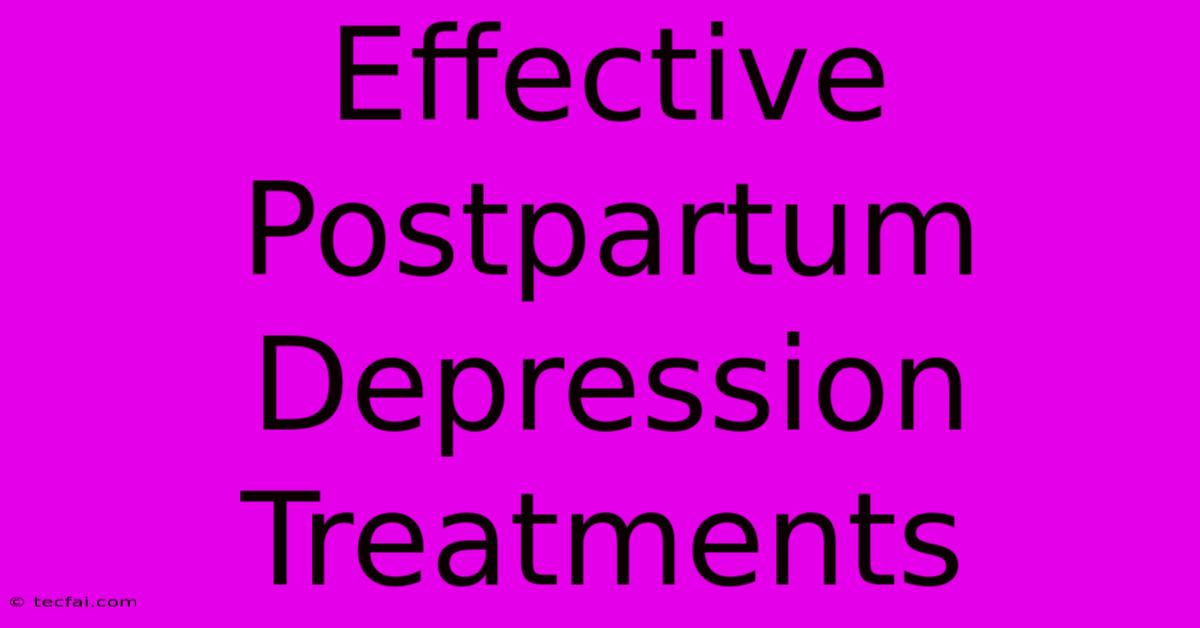Effective Postpartum Depression Treatments

Discover more detailed and exciting information on our website. Click the link below to start your adventure: Visit Best Website tecfai.com. Don't miss out!
Table of Contents
Effective Postpartum Depression Treatments: A Guide for New Mothers
Postpartum depression (PPD) is a serious condition affecting many new mothers. It's crucial to understand that you're not alone and that effective treatments are available. This comprehensive guide explores various treatment options, helping you navigate this challenging period and find the path to recovery.
Understanding Postpartum Depression
Before delving into treatments, let's clarify what PPD entails. It's more than just the "baby blues"—a temporary period of mood swings after childbirth. PPD is characterized by persistent sadness, anxiety, feelings of hopelessness, and overwhelming fatigue, significantly impacting daily life and the mother-baby bond. Symptoms can vary, but common signs include:
- Persistent sadness or low mood: This goes beyond the occasional tearfulness expected after childbirth.
- Loss of interest or pleasure: Activities once enjoyed now feel draining or unappealing.
- Changes in appetite or sleep: Significant weight loss or gain, insomnia, or excessive sleeping.
- Fatigue and low energy: An overwhelming sense of tiredness that doesn't improve with rest.
- Feelings of worthlessness or guilt: Excessive self-criticism and feelings of inadequacy.
- Difficulty concentrating or making decisions: Struggling with everyday tasks and problem-solving.
- Recurrent thoughts of death or suicide: This is a serious symptom requiring immediate professional help.
Effective Treatment Approaches for Postpartum Depression
Treatment for PPD is multifaceted and depends on the severity of symptoms. Many women find relief through a combination of approaches:
1. Therapy: Talking Through Your Feelings
- Cognitive Behavioral Therapy (CBT): CBT helps identify and challenge negative thought patterns contributing to depression. It equips you with coping mechanisms to manage difficult emotions and situations.
- Interpersonal Therapy (IPT): IPT focuses on improving relationships and communication, addressing interpersonal conflicts that may exacerbate depression.
- Psychotherapy: This broader term encompasses various therapeutic approaches, tailored to your individual needs. A therapist can help you process emotions, build resilience, and develop healthy coping strategies.
Finding a therapist: Look for therapists specializing in perinatal mental health. Your doctor or midwife can provide referrals.
2. Medication: Restoring Chemical Balance
In some cases, medication can be a vital component of treatment. Antidepressants, specifically selective serotonin reuptake inhibitors (SSRIs), are often prescribed. It's important to:
- Discuss medication options with your doctor: They can assess your specific needs and potential side effects.
- Be patient: Antidepressants may take several weeks to become fully effective.
- Monitor for side effects: Report any concerning side effects to your doctor immediately.
Note: Many antidepressants are safe during breastfeeding, but always consult your doctor before starting or stopping medication while breastfeeding.
3. Lifestyle Changes: Supporting Your Well-being
Alongside professional treatment, lifestyle adjustments can significantly impact your recovery:
- Prioritize sleep: Aim for adequate rest, even if it means asking for help with nighttime feedings.
- Eat a healthy diet: Nourishing your body provides the energy needed to cope with PPD.
- Engage in gentle exercise: Physical activity releases endorphins, boosting your mood. Even short walks can make a difference.
- Build a support network: Connect with family, friends, or support groups for emotional support and practical assistance.
- Practice self-care: Make time for activities you enjoy, even if it's just for a few minutes each day. This could include reading, taking a bath, or listening to music.
4. Support Groups: Connecting with Others
Connecting with other mothers facing similar challenges can provide invaluable support and reduce feelings of isolation. Support groups offer a safe space to share experiences, learn coping strategies, and build a sense of community.
When to Seek Immediate Help
If you experience severe symptoms, such as suicidal thoughts or thoughts of harming your baby, seek immediate professional help. Contact your doctor, a mental health professional, or a crisis hotline immediately. Your safety and your baby's well-being are paramount.
Remember: Recovery from postpartum depression is possible. Be kind to yourself, seek professional help when needed, and leverage the various treatment options available to you. With the right support, you can regain your well-being and enjoy motherhood to the fullest.

Thank you for visiting our website wich cover about Effective Postpartum Depression Treatments. We hope the information provided has been useful to you. Feel free to contact us if you have any questions or need further assistance. See you next time and dont miss to bookmark.
Featured Posts
-
New Super League Transfer Window
Dec 03, 2024
-
Coatings Market Analysis To 2033
Dec 03, 2024
-
Government Accused Of Recession Delay
Dec 03, 2024
-
Yuvika Chaudhary And Postpartum Depression
Dec 03, 2024
-
Neighbours Stars Non Fixable Cancer Battle
Dec 03, 2024
